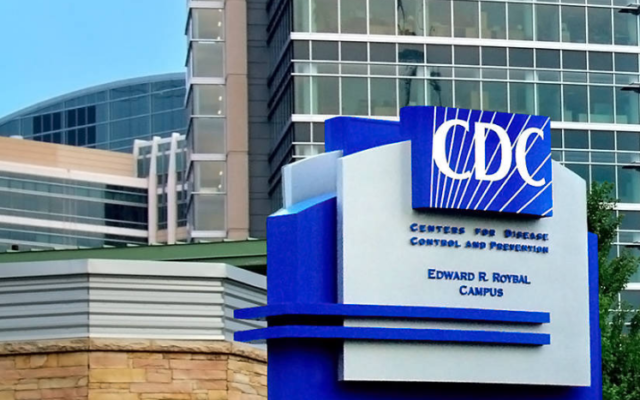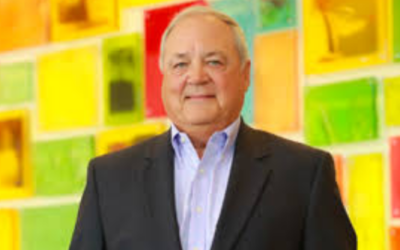CDC Transformation Boosted by Early Efforts
The CDC received a $4 million donation nearly 20 years ago by Bernie Marcus to address public health emergencies.

Almost exactly 19 year ago, in April 2002, Bernie Marcus made a down payment on the future of the CDC.
Marcus, the well-known head of The Marcus Foundation and a founder of The Home Depot, made a pledge of almost $4 million so that the federal Centers for Disease Control and Prevention could have an Emergency Operations Center.
At the time, despite the terror attacks of Sept. 11, 2001, and the deadly anthrax attacks that quickly followed, the CDC lacked a state-of-the-art operations hub for national emergencies.
When it was finally dedicated in 2003, CDC director Dr. Julie Gerberding expressed her appreciation.
“The CDC now has a world-class operations center equipped to handle any public health emergency, whether it’s a bioterrorism attack or an outbreak of a new disease,” she said, “The nation’s public health community had an urgent need and Bernie Marcus and other corporate donors stepped up to the plate and made it happen.”
Marcus’ gift helped to set in motion the transformation of the CDC’s campus into the massive complex of towering modern structures that reinforce the important role that the CDC plays today in the health of the nation.
But the new buildings are in sharp contrast to some of the facilities the CDC was using before the Marcus gift.
Phil Jacobs who was a BellSouth telecommunications executive at the time and a close friend of Marcus had toured some of the CDC buildings and was appalled by what he saw.
“It was incredible,” he told the AJT recently. “I’ve got photographs of some awful conditions.”

During the late 1990s some of the buildings the CDC was using in their campus on Buford Highway were collapsing.
“I have pictures of tarps on the ceiling that are holding water out over these million-dollar pieces of equipment,” Jacobs said. “There was one story of a woman who was an employee of the CDC who went into the ladies room and fell through the floor because all the the rotted wood.”
Determined to do something, Jacobs, Marcus and Kent “Oz” Nelson of UPS recruited several of Atlanta’s most important business executives. They convinced William Dahlberg at the Southern Company, James Kennedy at Cox Enterprises and Leo Mullen at Delta Air Lines, among others, to contribute $10,000 each to create an organization called the Corporate Friends of CDC, which repeatedly lobbied Congress to create a modern Atlanta home for the public health center.
“Long story, short, over a period of a number of years, we were able to get Congress to increase the budgetary appropriations so that over an eight-year period we got an additional $1.6 billion, which allowed us to build them in phases, obviously, to rebuild the entire Buford Highway campus,” Jacobs said.
But rebuilding the CDC complex was only part of the goal of the business leaders. As members of the Atlanta-based CDC Foundation as well as the Friends of CDC organization, they worked to raise millions of dollars to fund urgent new programs that weren’t in the CDC’s federal budget.
Marcus was the first chairman of the board when the CDC Foundation was created by Congress in 1996. Together with Jacobs, who was elected chair in 2005, they worked to raise awareness nationally of the importance of public health funding, including the impact that it has on corporate America’s bottom line.
Both men urged the creation of a Corporate Roundtable on Global Health Threats at the Foundation that would help to encourage the nation’s top business leaders to add their own public health initiatives to the mix that the CDC and the CDC Foundation were funding.
“We informed corporations of things that could happen in public health that would have a dramatic effect on their employees, on their financials, on their supply chain management and all of those elements,” Jacobs said. “So it drove a lot of these companies to look at disaster relief plans on how to deal with emergencies.”
Over the years, the CDC Foundation’s corporate and philanthropic sponsors have contributed over $800 million to further the work of the CDC.
In late January, the Foundation initiated an Emergency Response Fund, which so far has raised $30 million, much of it in the past few weeks. The Foundation expects donations could eventually total in the hundreds of millions of dollars.
“There are many immediate needs which are continuing to evolve along with the pandemic,” the Foundation pointed out recently. “Among those needs are support for vulnerable communities, increasing laboratory capacity, and boosting clinical research to optimize clinical care and research.”
For Jacobs there is a certain sense of satisfaction that the early efforts that were started by himself, Bernie Marcus, and others in the Atlanta community have made such an important difference today. Nonetheless, he seemed somewhat awed by the challenges confronting America and the world.
“I don’t think anyone ever anticipated the scale of what we are seeing now,” he said. “I don’t know that anyone ever dreamed of the astronomical consequences, the human consequences, of what we are facing.”
Learn more about the CDC Foundation’s crowdfunding campaign “All of Us: Combat Coronavirus” at www.GIVE4CDCF.org. For more information about the CDC Foundation, visit wwww.cdcfoundation.org.



comments